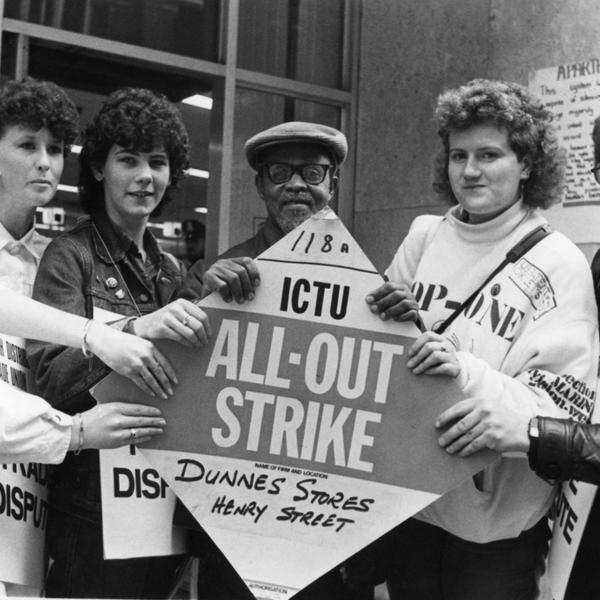
Dunnes Workers Fought Apartheid - Now Political Strikes Are Banned
3 February 2025
On the 19th of July 1984 Mary Manning, working as a cashier in Dunnes Stores on Henry Street, refused to handle two South African grapefruit in protest against Apartheid. She was directed by her union to do this and she was immediately suspended by Dunnes. This prompted 9 other workers to walk out in support.
It took two years of campaigning but the Irish government eventually banned imports from South Africa. The effectiveness of the strike by this small group demonstrated that organised workers who knew their rights and more importantly that knew their power as workers was dangerous to not only their employers but to the government itself.
The government were dragged kicking and screaming by a huge public campaign to the eventual ban on Apartheid goods and as soon as they could the government set about making it illegal for workers to strike for political reasons or in solidarity with other workers at home or oppressed people abroad.
The piece of legislation they drew up was called the Industrial Relations Act 1990. It was made law on the 18th of July 1990 - nearly 6 years to the day after Mary Manning was suspended for her principled stand. This new Act banned political strikes but it also set out to:
- Place restrictions on where pickets can be located
- Ban workplace sit-ins
- Ban solidarity strikes
- Make secondary pickets illegal
- Made changes to individual workers rights
- Added extra steps in the process making it far more difficult to legally strike
It aimed to completely take back power from workers who had been gaining in confidence thoughout the 1960s. This worker confidence threatened a society that funnelled all the wealth produced by workers to the top.
Strikes, pickets and sit-ins have a long history in Ireland and have shown workers that they can be used to make the bosses and the government give in to our demands.
The rich saw the writing on the wall: if workers will strike in solidarity with exploited people 10,000km away in South Africa it is only a matter of time before they start striking and shutting down the economy in Ireland to break their own chains.
The result 35 years later: Ireland ranks 3rd for wealth inequality in the EU. Ireland is the 2nd most expensive country to live in the EU and 15,000 people are homeless. Wage growth is historically low while productivity is at an all time high.
Single worker disputes were targeted in the Act. Previously when an individual had a dispute with an employer the entire workplace could be shut down as their colleagues walked out in solidarity until it was resolved.
Now a worker must go through multiple hoops on their own - which can take months or even years.
Solidarity strikes and secondary strikes were an important part of worker power before the Act was introduced. In any given workplace it is not uncommon for workers to be represented by different unions.
To strike now, all the workers would need to coordinate and start the months-long process to strike to shut down a workplace. This includes mediation, talks, negotiation all which can be slowed to a halt by greedy bosses aided by the State itself in its Workplace Relations Commission (WRC) where they are to be held.
All the while the workers grow frustrated, get victimised and harassed by management. We have seen this in recent years in strikes such as the nurses strike in 2019 and school secretaries in 2020.
With other workers legally forced to cross a picket the sting is taken out of the work stoppage. Taking the school secretaries strike as an example: Imagine if school caretakers, Special Needs Assistants (SNA’s) and teachers refused to cross the picket - The Department of Education wouldn’t take long to give those essential workers their modest demands, of fair pay, permanent contracts and a pension.
These are not radical demands.
The Act prohibiting political strikes was a more sinister addition. It had one eye on the political class and rich elites’ aim of integrating Ireland closer into the global capitalist system. They knew this would draw the country closer to imperialist powers committing atrocities in the Middle East and Africa in the name of making money.
The story of the 10 shopworkers in Dunnes Henry street resonates today - many of the companies profiting from the genocide in Gaza operate in Ireland and while street protests show solidarity a real way of affecting change would be to hit these companies where it hurts - in their bottom line.
The Dunnnes workers were one part of a larger global anti-Apartheid movement. Students in the UK chose a single day to close Barclays bank accounts in protest of Apartheid and this forced Barclays to pull out of South Africa.
All these actions co-ordinated alongside a cultural boycott and the movement of black workers in South Africa itself built pressure to bring down a brutal regime.
Workers are prepared to strike to implement a ban of Israeli goods and services in Ireland. The thousands that protest every single week in most towns in Ireland show this support. Fianna Fail and Fine Gael since 2018 have blocked the implementation of the Occupied Territories Bill which bans import of goods produced in the illegal Israeli settlements in Palestine.
With no legal way of striking to force the government to implement the Occupied Territories Bill they are free to continue to do business with a genocidal regime. We see HP computers in every office in the country and they are deeply involved in the Apartheid system in Israel.
If workers in Ireland could legally refuse to use these like the Dunnes workers could refuse to handle South African fruit in the 80’s they could very quickly strike a blow to the income of HP forcing them to withdraw from Israel like Barclays withdrew from South Africa.
The world we live in today is built on exploitation - fruit grown and picked by underpaid workers in Mali appears in Lidl, cheap oil from the middle east, corporate money which should be paid in tax in Bolivia is ran through the IFSC in Dublin to avoid those taxes and a fraction gets paid here.
The Irish economy is built on exploitation - whether seen or unseen and if workers started organising to end this exploitation of themselves or others then the party would be over for the rich 1% in charge. This frightened them in the 80’s and that is why they brought in some of the strictest trade union laws in the world.
The 1990 Act defines a narrow list of things workers can strike over. It sets out where you can strike. It provides protection for employers and the government but also the Trade Unions. They have always worked with the Irish establishment to act as a brake on workers who are getting too radical and reign them in.
They will “fight” for measly pay increases, modest improvements in work conditions but will never fight for radical change and they use the 1990 Industrial Relations Act as an excuse for slowing our demands. They can now argue with members that we can’t strike for demands that improve our society because they will be deemed illegal and the union will be fined.
So they win crumbs for workers to placate them and avoid an outright revolution.
Workers are more productive than ever in Ireland, producing wealth that we will never see for it to be hoarded by a small group of people. We need a political movement that will bring together workers and organise them to fight against the political system, the economic system and take back the wealth we make so that there is a roof over every person’s head and they have enough food in their stomachs.
People should not be forced to choose between eating or heating their home.
100 years ago the revolutionary Bolshevik Party’s slogan of “Bread, Land and Peace” voiced the basic demands of workers and the exploited in Russia. Today it is still completely relevant. If us workers do not overthrow the system that exploits us “peace between the capitalist States will be only a truce, an interlude, a time of preparation for a fresh slaughter of the peoples” (Lenin, 1917).
We have seen the establishment attack on our neutrality for the past 3 decades, allowing flights to stop off at Shannon Airport on the way to slaughter workers in the Middle East continue to this day. Taoiseach Micheal Martin spent the duration of the last government pushing for Ireland to join Nato.
We have watched a slaughter of tens of thousands of people in Gaza live on our phones while the Irish Government stood back and have done next to nothing. All they saw was the unimaginable profits made by the companies involved in that slaughter and they want in on the action. Workers must get organised and get radical.
It’s time to take on the 1990 Industrial Relations Act!
 RED NETWORK
RED NETWORK